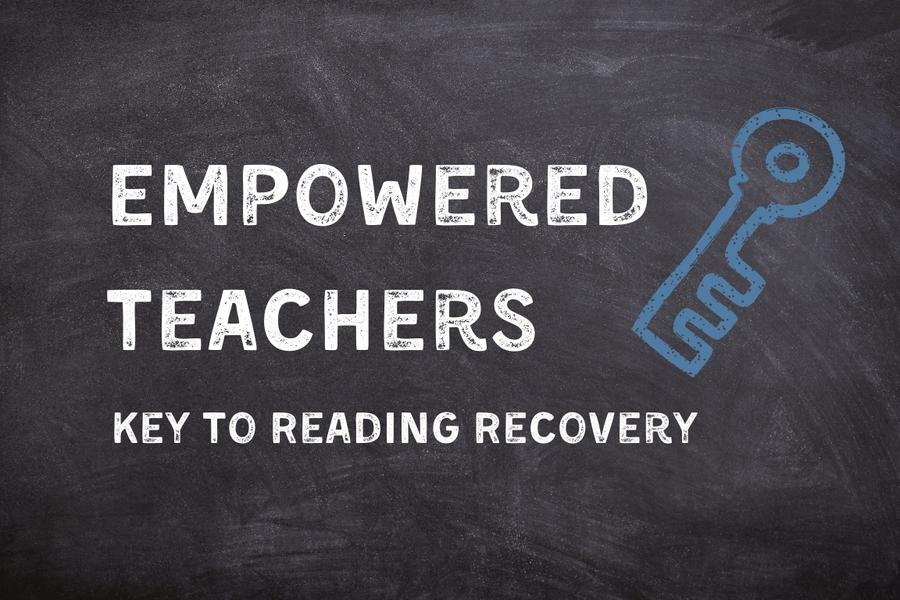BLOG
Empowered Teachers: Key to Reading Recovery
by Elizabeth L. Kaye, Ph.D.
For decades, Reading Recovery® teachers have been successfully teaching first-grade children who have been unsuccessful in their classroom literacy programs to read and write within a period of only 12 to 20 weeks. The key to Reading Recovery’s success is not found in a box of purchased materials, a strictly sequenced curriculum, or a set of scripted lessons. To the contrary, the key to Reading Recovery’s success is a knowledgeable, effective teacher. Thus, when schools select Reading Recovery, their investment is in developing teacher expertise. Participating teachers are provided professional development that empowers them to design and deliver high-quality, individual lessons for young learners in need of specialized support to acquire early literacy. The quality of this teacher training is an important guarantee of the Reading Recovery trademark.
In this discussion, the term Reading Recovery refers to all implementations of this early literacy intervention and teacher training in the languages of instruction used in North America. These include English, Spanish (Descubriendo la Lectura), and French (Intervention préventive en lecture-écriture). Professional development activities of all teachers affiliated with these implementations are identical, and thus the term Reading Recovery, used in the following discussion, encompasses all.
Reading Recovery teachers participate in year-long, graduate-level coursework taught by highly knowledgeable teacher leaders in their district or region. Following an initial week of assessment training in which they learn to administer and interpret An Observation Survey of Early Literacy Achievement (Clay, 2019), teachers actively participate in weekly, or biweekly, classes that consistently integrate theory and practice.
Teachers learn to observe closely and articulate individual children’s literacy behaviors, analyze children’s responses to instructional interactions, and adjust their teaching to ensure students learn at an accelerated pace. As part of teachers’ professional learning, they teach individual lessons to children behind a one-way mirror, and this provides powerful learning opportunities for their colleagues to watch, discuss, and reflect upon teaching and learning in real time. This unique experience helps teachers converse about effective teaching and apply new understandings to their own teaching.
Reading Recovery teachers also receive at least multiple coaching visits from teacher leaders during their initial year of professional learning. Teachers get personalized consultations about their students and their teaching, and they also receive support for implementing Reading Recovery in the school. Reading Recovery teachers become adept at supporting learners and communicating about students’ progress to families, classroom teachers, and school administrators.
Following the year of initial training, high-quality, ongoing professional development occurs on a regular schedule each academic year for as long as Reading Recovery teachers remain in their positions. This professional development includes both sessions with teaching at the one-way mirror and coaching visits to support teachers in their schools. These collaborative learning experiences ensure teachers are continually refining their expertise.
A highly qualified teacher makes an important difference in student outcomes, especially for children having difficulties. Reading Recovery’s professional development is widely acclaimed as an investment in the professional skills of teachers and a model worth emulating (Darling Hammond, et al., 2017; Herman & Stringfield, 1997). Additionally, a school’s Reading Recovery teacher is a rich resource of research-based understandings of early literacy, and this teacher’s professional knowledge provides key benefits for other teachers and administrators, potentially creating system-wide changes.
The decision to provide Reading Recovery for children in need of specialized support is an investment in teacher expertise, and this investment provides both measurable and immeasurable results for children, teachers, and schools.
Elizabeth L. Kaye, Ph.D., is the Associate Professor and Director of Reading Recovery at Texas Woman’s University.
References
Clay, M.M. (2019). An observation survey of early literacy achievement. 4th edition. Global Education Systems Ltd. First published 1993, 2nd edition 2002, 3rd edition 2013.
Darling-Hammond, L., Hyler, M. E., Gardner, M. (2017). Effective Teacher Professional Development. Palo Alto, CA: Learning Policy Institute.
Herman, R., & Stringfield. S. (1997). Ten promising programs for educating all children: Evidence of impact. Arlington, VA: Educational Research Service.
THE JOURNAL OF READING RECOVERY
Spring 2024
Constructing a More Complex Neural Network for Working on Written Language That Learns to Extend Itself by Carol A. Lyons
Reading Recovery IS the Science(s) of Reading and the Art of Teaching by Debra Semm Rich
Predictions of Progress: Charting, Adjusting, and Shaping Individual Lessons by Janice Van Dyke and Melissa Wilde
Teachers Designing for Context: Using Integrity Principles to Design Early Literacy Support in Aotearoa New Zealand by Rebecca Jesson, Judy Aitken, and Yu Liu




